btw i just started reading this book Einstein’s Jewish Science and it’s awesome i esp recommend it for jewish ppl
Tag Archives: jews
Mean Girls: Feminist Review and Analysis
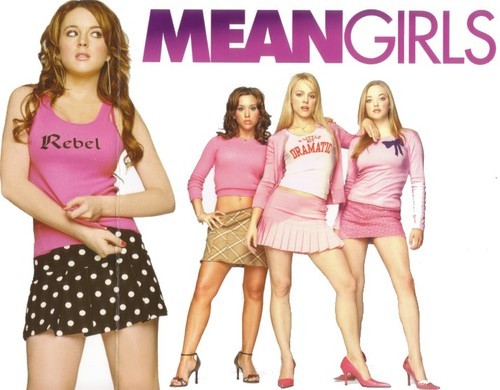
Mean Girls has become a pop cultural phenomenon of memetic proportions. Even people who have never seen the movie can quote from it at length. Considering that the movie is female-centric and tackles issues like girl hate and body image, many people hail Mean Girls as feminist, and it’s clear that the screenplay writer, Tina Fey, intended it be so as the protagonist “Cady” is named after suffragette Elizabeth Cady Stanton. But in my opinion, Mean Girls is not actually very feminist. Don’t get me wrong: the movie is obviously incredibly well-done. I think it’s super clever satire, and there’s positive aspects for girls in the movie, but I enjoyed it as a well-written, entertaining film—not as a feminist one, for various reasons.
This post is first in my series of feminist reviews of media. See here for details on my ratings system and criteria.
Everyone who hasn’t seen this movie probably knows what happens through gifs alone, but obligatory spoiler warning.
Mean Girls centers on protagonist Cady, who has been homeschooled all her life and is completely new to the social dynamics of high school. Two outsiders, Damian and Janis, take her under their wing, but when the Plastics, the prettiest and most popular girls in the school, vie for her attention, she is sent in as a mole by Janis to infiltrate the Plastics and undermine Queen Bee Regina George’s cruel reign. Throughout the movie, Cady winds up becoming something of a Mean Girl herself, blowing off her friends and becoming enamored with the Plastic lifestyle. The girls, especially Regina, manipulate, insult and bully each other. The film’s resolution comes after the contents of the Burn Book, where the Plastics write all the school gossip, are revealed to the whole school, and when all the girls in the school are forced to resolve their conflicts.
Women: 6/10
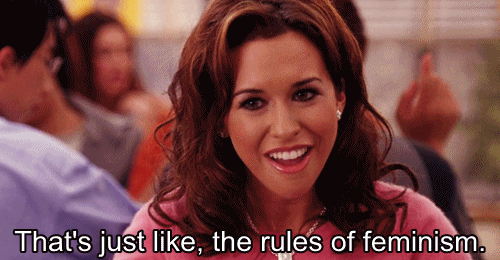
Mean Girls‘ strengths lie in its girl-centricism and how it encourages girls to rise above attacking each other or downplaying their own abilities for men. The movie delivers these messages in a comedic way through the development of its protagonist and other central characters. But while the girls eventually learn to support each other and stop bullying each other, the actual problems in society that cause girls to act this way are never explored. The film makes it look like teenage girls act this way just because and only need a kumbaya session to get over it. And while the girls are more developed than the boys and take center stage, most of them are stereotypes. The Plastics are a trio of caricatures: the dumb blonde (Karen), the Jewish American Princess (Gretchen), and the backstabbing popular girl (Regina), but even the other main female characters, who are portrayed more positively, don’t escape this fate: such as Cady’s friend Janis, the snarky, eccentric lesbian and Tina Fey’s character, Ms. Norbury, the pitiful spinster, and most of the side characters are little more than whatever clique they belong to (band geek or Asian mathlete).
Cady, the protagonist, is the most developed character with a multifaceted personality. Unlike everyone else, she does’t fit easily into stereotype, but she is a white homeschooled girl from “Africa” with a complete, unrealistic ignorance around American culture and teenaged socialization. She seems to come from another dimension where there’s no such thing as “society.” Thus, the person who cures Girl Hate in the movie is a mythical figure who doesn’t exist in real life: someone introduced to the beauty industry and internalized misogyny at the age of 16. It’s no accident Cady isn’t a popular girl who learns the error of her ways. Or, heaven forbid, a popular girl into fashion who isn’t mean. Nor is she a nerdy girl grappling with her social standing. She is a magical Outsider immune to all this stereotyping in the first place, moving between nerd and popular girl, while everyone else fixedly adheres to stereotype, allowing the film to side-step truly challenging stereotypes or addressing the sources of internalized misogyny altogether.
Why do the girls put down their own appearance and that of other girls? Why are they so mean to each other? The movie never tries to parse this out. The male characters in the movie are peripheral, which is both good and bad: good in that girls are the center of the movie, bad because the main source of misogyny in the film is girls themselves. In fact, men and boys are rarely shown being sexist whatsoever, and when they are, it’s a joke or minor plot device. Unlike Legally Blonde, which depicts women working together to confront misogyny from men and society, Mean Girls presents misogyny as a girl problem. It’s not that boys like Aaron, Cady’s love interest, are intimidated or turned off by girls like Cady being good at math, it’s that girls like Cady just dumb themselves down to have an excuse to talk to these boys. It’s not that our society has a vicious beauty industry that literally pressures girls into starving themselves, it’s that a few popular girls decided that being thin is important and so they take dangerous drugs to get skinny, which is funny somehow. Men can sit through Mean Girls, content in the knowledge that girls are just catty and mean, so misogyny is their problem to fix. But the film doesn’t even offer girls any real tools to address internalized misogyny!
The movie is definitely far from wholly negative, though. It’s important that the movie ends happily, with Queen Bee Regina not remaining demonized, but finding a suitable outlet for her anger (sports), and girl hate being overcome (even if the “solution” in the movie isn’t applicable to real life). It’s also wonderful to see the gender roles reversed with heartthrob Aaron being nothing but a tool to Regina and a vapid male bimbo with no real traits other than being incredibly attractive and kind but bumbling, and the other white boys, like Regina’s jock boyfriend and Gretchen’s love interest, being similarly vapid. It’s also true that the movie is lacking the outright misogyny intrinsic to so many Hollywood films and replaces it with girl power—but all of it is incredibly superficial and in place of what could be a much more feminist narrative.
PoC: 4/10
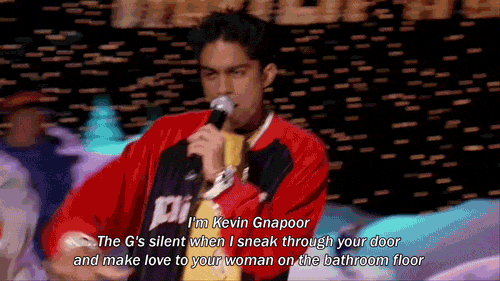
Throughout the movie, many PoC are visible in the background and make brief appearances in small roles. They have one-liners like “I’m from Michigan” from a token Black girl who is assumed by the teacher to be from Africa, when Cady actually is (which in and of itself is racist—what country or city in Africa is Cady from? And why is Africa treated like a savage wilderness when there are cities there?). PoC serve mostly as background decoration behind a white central cast, and, unfortunately, are at times reduced to stereotype. There’s even a scene where Cady’s friend Janis points to different cafeteria tables pointing out “the nerdy Asians,” “the cool Asians” and the “unfriendly Black hotties.” Most troubling is the portrayal of the Asian girls in the movie, who are shown only speaking Korean and being completely isolated from the social world of the rest of the school and continue to be “queen bee types” even after the rest of the girls have improved. Worse, the school coach making out with two of these Asian girls is made into a joke, playing into the racist notion that Asian girls are more “grown up” and sexual.
One of the very few prominent PoC characters is Kevin, the overbearing South Asian mathlete who appropriates AAVE and hits on women. I would say Kevin’s portrayal is mixed: he’s funny and not exactly a complete stereotype but also offensive in his sexism and Black appropriation. Most of the white boys in the film are benign and passive, but Kevin is pushy and sexist throughout the movie, though it’s played for laughs. The school principal Mr. Duvall, a Black man, is probably the best PoC representation in the film. He defies stereotype as occasionally stern but never unkind and is neither hypersexualized or desexualized, shown displaying a romantic interest in Tina Fey’s character in a charmingly awkward way. There is one point when he shouts: “Aw, hell no. I didn’t leave the south side for this!” when the school girls all begin fighting in total pandemonium. This moment is interesting: an educated and well-dressed Black man is briefly revealed to be from a lower class background, but neither his accomplishments nor social standing are undermined, subverting the racist dichotomy between “bad” Black person (or “thug”) and “respectable” Black person in this moment of code switching. He doesn’t get much screen time or development, though.
Janis’ character is technically a WoC (Lebanese) but is played by a white Jewish woman, and we go nearly the entire movie with the assumption she is white until she mentions being Lebanese. Earlier in the film, Kevin, who she winds up in a relationship with, mentions only dating women of color (which is played as a joke somehow?) so it seems they shoe-horned in her being Lebanese last minute for the sake of a punchline. Overall, Mean Girls isn’t racially progressive, as stereotypes are upheld and white faces take the foreground.
Trans people: —
There are no trans people in this film, but there are also no trans jokes as far as I could tell.
Sexual Minorities: 4/10
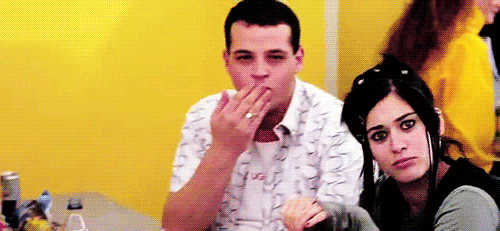
Although Damian and Janis, Cady’s close friends, are prominent characters, they represent a lot of what is wrong with gay representation in the media. Damian, the large and lovable gay sidekick, has always been a controversial character. His trademark line “too gay to function” is oft-quoted and oft-criticized. Damian is de-sexed and safe. He exists to be fabulous, funny and make cute jabs about fashion. He wants to be one of the girls: he even goes in the girls’ bathroom and is actively part of Girl World, as Cady calls it. The conflation of gender and sexuality is of course problematic. But Damian is overall presented as a likable, good person and friend, and gets a lot of screen time—further, it can’t be denied that feminine gay men like Damian exist. He does, however, only serve a heterosexual plot line and has no sexual or romantic interests of his own. This is a common trope that keeps gay men palatable to straights.
Despite ending up with a boy in the end, Janis is heavily lesbian-coded throughout the movie and continually referred to as a lesbian, which she never denies. Janis claims that saying Damian is “too gay to function” is only ok when she says it, and the reveal of Janis once having a crush on Regina during their friendship in junior high, as well as her insistence on keeping it secret is telling. In my view, she is subjected to the common homophobic trope of Lesbian Living Happily Ever After With a Dude. Further, if you think about it, Janis is arguably the meanest and most manipulative of the girls—she completely uses Cady to get sadistic revenge on Regina, going further than any of the other girls do, and relishes it at the end. Then again, all of this is presented as justified in the film, and she is a prominent character and is funny, witty, insightful and resourceful. But her ending up with a guy is a cop out: some people will interpret her as having been straight all along. All in all, both characters uphold many tired homophobic tropes even while they grant us desperately desired and prominent representation.
Disability: 3.5/10
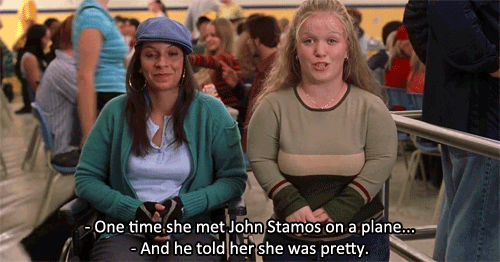
The two visibly disabled characters in the film—a girl in a wheelchair and a little person—are little more than window-dressing in this movie. They aren’t, thankfully, reduced to jokes or stereotypes and at least present some positive representation. Regina’s use of the R-slur, which is not criticized, although it arguably reflects negatively on her character, also brings down the representation rating. The film also trivializes eating disorders when it jokingly refers to “girls who eat their feelings” and “girls who don’t eat anything” as cliques. The movie does better than most by simply including physically disabled people as just everyday people just living their lives without negative stereotypes, but considering they have bit parts, they are little more than tokens.
Abuse/Assault/Relationships: 6.5/10
Overall, the way relationships are depicted in this film is positive in terms of conflict resolution, apologizing and forgiveness. The girls had very dysfunctional and harmful relationships with each other, but they improve. In fact, most of the adults in the movie, who act as moderators in these conflicts, have healthy relationships with the students. Tina Fey’s character, math teacher Ms. Norbury, serves as a good role model for the girls in the movie, especially Cady. The way she helps the girls make up but also retains her status as an authority figure is healthy: she pushes Cady, expresses disappointment and also encouragement at the right times. Cady’s parents too seem to exemplify this balance well, as peripheral as they are in the movie. They are new to the task of handling a teenage girl in a public school environment, but they take seriously enforcing her being grounded, but also are supportive and care. The bad adult role models are presented negatively—such as Regina George’s mother who tries to be a “cool mom” and a friend to her daughter, wanting to be young again. She allows Regina to do whatever she wants, which is implied to negatively contribute to Regina’s character.
As mentioned before, a deeply troubling aspect of the movie is how the coach making out with two Asian high school girls in the film is made into a joke and glossed over. A school teacher preying on a minor under his care is turned into a punch line—it’s essentially a rape joke. In terms of abuse, Janis is very manipulative, but never portrayed negatively for this. She uses Cady to exact revenge against Regina and when she confesses her actions, she is praised for it. Also, when Cady calls Janis out for her manipulation, Janis only puts the blame back on Cady. There never really is conflict resolution for this, either. There’s also the fact Gretchen retains the same character flaws and remains a mean girl but only in the Korean girl clique, which is presented as a positive resolution somehow. All the romantic relationships took a backseat to female friendships, so I found them to be bland and unremarkable, neither negative nor positive.
Body Image/Body Diversity: 3.5/10
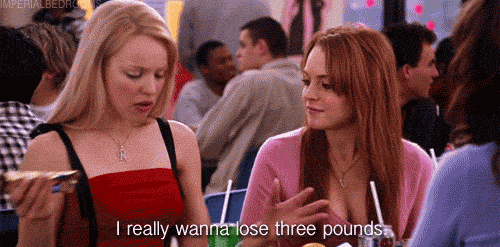
Mean Girls continually depicts teenage girls disparaging their own appearance and insulting and critiquing the appearance of other girls. This is, however, presented in a critical way and by the end of the film, Cady realizes that doing this won’t get her ahead in life. That’s a positive message, but by the same token, the film doesn’t ever unpack why girls do this or the underlying problems of body image. Further, we continually see the main characters of the movie, who have idealized, perfect bodies, putting their own appearance down—this is presented as a silly ritual the girls undergo, but it also is never shown to be as damaging as it is on female self-esteem. Worse, is Regina George’s “weight gain.” At one point in the film, Cady tricks Regina into eating Kalteen bars that will make her gain weight as part of the plan to dethrone her as Queen Bee. I question the need to focus on Regina’s weight in her “take down” whatsoever, as it just reinforces fatphobia, especially since her “weight gain” is quite subtle and the issue of weight is never truly explored.
Damian and some side characters provide some body diversity, but fat characters as a whole, especially the girls, pretty much just provide jokes or punchlines in the movie: the “attractive” characters are all thin. The movie satirizes female obsession with weight and image, encourages girls not to put others down for their appearance and also shows Cady as improving when she compliments other girls on their appearance, but it never actually gets to a real criticism of body image, nor does it ever present fat people as being as attractive as thin people.
Jews: 3.5/10
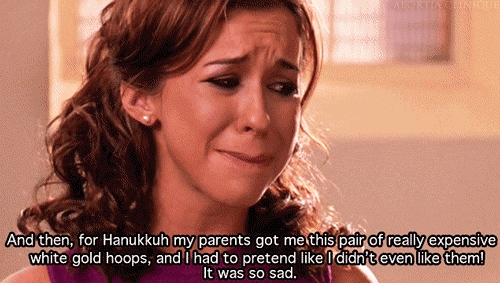
Blink and you’ll miss it, but Gretchen Wieners is canonically Jewish: as the above gif confirms, she celebrates Hanukkah. Many viewers probably watched Mean Girls and remained unaware of this fact considering this one line is the only indicator of her Jewishness. With the acknowledgment Gretchen is Jewish, however, comes the question of her representation of Jewish women. While Gretchen is much less cruel than Regina (as is Karen, the “dumb blonde” of the trio), she also is perpetually a boot-licker to whoever’s queen bee (something she secretly resents). And she of all the Mean Girls arguably changes the least—remaining unapologetic about her meanness and retaining the same status of mean girl, just within the microcosm of the Korean students.
Some have questioned if Gretchen upholds the Jewish American Princess stereotype—i.e. the idea that Jewish American girls and women are spoiled, monied, neurotic and high-maintenance. As others have pointed out, her wealth is her most notable feature as the daughter of the inventor of toaster strudel. The gif above itself highlights how spoiled she is, same with when she threatens the principal with her father’s status to get out of trouble. Her neurosis is revealed as Cady gets under her false exterior… That said, it’s positive to see a Jewish main character included in a film like this who is also presented as beautiful, but considering that her Jewishness is nearly invisible, that she is played by a non-Jew, possesses stereotypical traits, and exhibits little character development/growth, I can’t say she provides good representation.
Conclusion
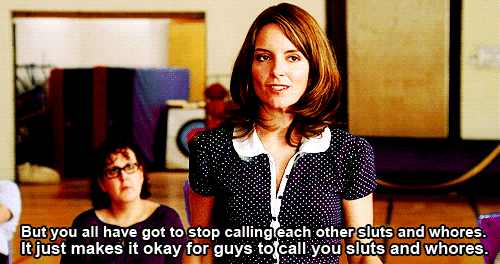
In the end, Mean Girls is representative of today’s defanged pop feminism that says women need only “lean in” and change their behavior to get ahead in society. Tina Fey’s quote that if girls call each other sluts, it makes it okay for guys to, basically sums up the main premise of the film: that misogyny is a problem with girls and women, not with men and patriarchy. Don’t get me wrong: internalized misogyny and girl hate are major issues, but what’s odd about this movie is the implication that girl hate magically appears from nowhere. Sure, the movie may serve as a good launching point for having a discussion with young girls about bullying and body image—but on its own, it doesn’t engage in any real feminist critique or break much ground, and it especially fails women marginalized on other axes. Girl-centric, witty, and hyper-quotable, Mean Girls is a fun time and an incredibly well-made movie with a female-written and female-centric script that encourages girls not to tear each other down, but when you analyze it a little deeper or compare it to more feminist comedies like Legally Blonde, its feminism falls short.
shout out to patrilineal jews
you are not a fake jew. you are as jewish as you say you are and you matter
Hi! I saw your post about the US and WW2 and I was just wondering what you meant about Americans associating Jews with whiteness? Also what did you mean by “people continually allege Jews were white in Nazi Germany despite the fact Nazis killed them, literally, to purify the white race”?
Regarding this post:
Well, in the US Jews are usually seen as white—not always, though—and it didn’t used to be that way. Earlier in US history Jews were not racialized as white at all. We became more and more assimilated into whiteness later on, I’d argue in part to buttress the United States’ narrative about being antithetical to Nazi Germany and the savior of the world in WWII). Whiteness is a strange construct. It differs from place to place. Overtime, Jews have become more and more assimilated into whiteness in the US, but it wasn’t always that way. Racial Others are oppressed if they are not racialized as white. Most people in the US are pretty uncomplicatedly white or PoC, but Jews occupy a weird space in-between, where we are mostly seen as white, but are seen by Neo-Nazis and white supremacists as enemies to the white race—also, there are situations where we are still racialized as other. But I would argue that most of the time in the US we are racialized as white.
HOWEVER, Jews are not racialized as white in Europe to this day and they certainly were NOT racialized as white in NazI Germany. That’s what that second quote is about. People continue to act like Jews are an example of white victims of genocide when this completely contradicts the history of antisemitism in Europe and how Nazis and Europeans racialized Jews. Nazis wanted to purify their country by killing or phasing out non-white others. Their entire goal was to exterminate or cordon off undesirables. Jews were at the top of that list. They also targeted Romani and sterilized Black children. Nazis were enamored with the Aryan I.E. white race. Nazi ideology is white supremacist ideology. It’s also colonialist ideology: they saw the entire world as the German Empire and other countries as arbitrary lines in the sand of their Fatherland meant to be erased.
It baffles me to be honest, that people continually act like Jews were white victims when all of the Nazis’ rhetoric was all about white supremacy and the pure white Aryan race. Their whole system of determining who was Jewish or not came down to blood: how many grandparents you had who were Jewish. And the Holocaust did not poof into existence out of nowhere. Pogroms, oppression, executions, segregation, and discrimination toward Jews happened throughout European history leading up to the Holocaust. All of this is tied to white supremacy in Europe. In the US, they don’t teach this. Probably partially due to the fact that US invented eugenics and race science, which Nazis derived their ideology from. And also because the US doesn’t care about Jews and also has their hands dirty when it comes to the history of antisemitism. They just care about teaching WWII in a way that makes the US look good. And I’d argue the assimilation of Jews into whiteness is part of that narrative.
That in a nutshell was what I meant.
hi! i’m half jewish and appear white to most people, and i was wondering what that makes me? i mean, i wouldn’t call myself poc, but i have experienced racism both irl and online, and tumblr debates about white people not experiencing racism (and the recent rise of antisemitic violence in europe, where i live) kind of made me doubt my own… whiteness, i guess.
I know the feeling. I’ve also had white supremacist literally treat me as non-white. Like several months ago, I had one neo nazi talk about my attitudes toward white people, clearly talking about me as if I was not one of them. It was the first time I’d ever experience that and it was incredibly upsetting and baffling for me at the time. Most of the time people consider me to be white—especially since I live in a big city in the US.
The whiteness of non-PoC Jews in the US is a big point of contention, debate and complexity. I would say we definitely have a lot of white privilege. I’ve used the term “conditional whiteness,” and I’ve seen other people (including PoC) use this term for us before.
I really want to stress, though, that in the US we have a lot of access to whiteness—a lot more than white passing PoC do. And for me, 99% percent of the time I am treated as white. I have experienced a few instances where I felt racialized as other, though. I’ve had a man hit on me and fetishize my “foreign” features before (although he described them as European and asked if I was from Easten Europe). I’ve had people think I’m from somewhere else (another country I mean). I’ve also, like I said, had white supremacists target me online, and I fear them on a level i know WASPS (that is, non-Jewish white people) don’t have to fear them. In trying to connect with my heritage and identity, I’ve found this process difficult and the experience of Jewish ethnic erasure and assimilation very unlike what I think people of uncomplicatedly white ethnicities ever experience.
But yes, we are not PoC by any stretch of the imagination. And the vast majority of time in my waking life I have loads and loads of white privilege and have to check myself much like most other white people. I also do think some of this can come down to geographical location. When I lived in a rural area in high school, people were much more overtly antisemitic and would literally call people “Jew” as an insult, laugh at my brother during a presentation on the Holocaust, and ask him shit like “where’s your gold chain?” Stuff like that. But where I live now I pretty much never encounter anything like that (except for that one fetishizing dude and a few people who have thought i was from another country – but those are three instances in my entire five years living here).
I also agree with you about the weird othering that can happen to us in debates about racism. For instance, once I was talking to my (non-Jewish and white) mom about a death threat I got in an anonymous submission on tumblr. This person called me a kike and said I should be slaughtered like a pig, and, frighteningly enough, seemed to attend my college, given that the email they used was from my school. And this happened, one day after I shared my blog with people in one of my classes. This resulted in me dropping all my classes and carrying pepper spray on me and fearing for my safety. After I told my mother about this, she started telling me about an experience of ~reverse racism~ she experienced as if it were the same. I felt REALLY othered and really racialized as non-white in that moment. Like you, up until recently, I went through my whole life blissfully believing I was white and had the same access to whiteness as everyone else, and I never had to question it until I saw Jewish bloggers on tumblr talk about it. And then I never really questioned it deeply until that neo-nazi overtly treated me as not white.
So in short, it’s complicated. We aren’t PoC, we have privilege over PoC, which becomes even more obvious when you compare our experiences to PoC Jews, AND we have a lot of access to white privilege, but the fact KKK members and other white supremacists literally obsess over us and commit hate crimes against us and see us as “enemies to the white race” really shows that it’s not quite so clean cut. Different people have different views on the Jewish question of whiteness. To be honest, I move back and forth a little. I get worried about us non-PoC Jews in the US downplaying our white privilege. But at the same time there’s this weird tension where tons of Jews strive to assimilate into whiteness and disappear into it, and yet so many people won’t let this happen. Like, either we are good Jews and our Jewishness is erased or we are bad Jews and it’s emphasized and degraded. There’s not usually much outside of this dichotomy (the exception of course being Holocaust survivors because that plays into a particular US-friendly narrative). And we often get punished the more we overtly display our Jewishness: we are expected to downplay and hide it and are rewarded for that. Consider the fact many Jewish celebrities like Jon Stewart change their names to be more goyish. As far as I know, there aren’t people of uncomplicatedly white ethnicities doing shit like the en masse in 2014.
The best term I have found to discuss the racialization of Jews in the US is probably “conditionally white” or “conditional whiteness” or “white privileged/access to white privilege.” I usually just call myself white due to how much privilege I have in my everyday life, but sometimes I feel a lot of dissonance, like when Frazier Glenn Miller, a former KKK member, attacked a Jewish community center and Jewish retirement home or when white supremacists use antisemitic rhetoric, or when Jews are racialized as non-white by other people. So again, it’s not an easy thing. One reason I like the term conditionally white is that “white passing” isn’t accurate as many people still see Jews as white even if we are out as jews. But still, although we are often treated/racialized as white, our whiteness can be taken away which is different than WASPs. So “conditionally white) is my term of preference for speaking about the racialization of Jews in general.
I’m not Jewish, but I love how you break the stereotype that all Jews are anti-Palestine. I admire your posts, and I think you’re pretty cool. :)
thank you!!
yeah that stereotype is untrue – there are whole organizations founded by Jews in support of Palestine and against Israel i.e, Jewish Voices for Peace, Jews Say No, Jews for Justice for Palestine, etc
however, i will say that some american jewish institutions are in support of israel: like the anti-defamation league and some Jewish schools will teach kids pro-Israel propaganda, also some synagogues will emphasize a connection to Israel but there are progressive Jews and rabbis who are anti-Israel and Pro-Palestine. most Jews I know on tumblr are Pro-Palestine
and i’ve said this before but it’s also important to break that misconception because Israel really wants to associate Jews as a whole with Israel and perpetuate this idea that being against Israel means you’re antisemitic and against Jews, which works to their advantage
I am a Jewish female living in Australia who is very anti-Israel/pro-Palestine (I have literally no connection to Israel at all, or desire to ever go there if offered.) But lately I have been seeing a lot of criticism that verges on anti-Semitism especially in regards to when celebs speak out against Israel and people conflate that with the tired old idea that “oh not watch what you do, jewllywood is coming for you!” how can I tell people that is a harmful idea to spread?
I would just explain that there’s a difference between criticizing Israel and criticizing Jews. And that, though in Israel Jews have special privileges, everywhere else in the world they are an oppressed group—especially in Europe, where Jews are not seen as white and where there’s a history of ethnic cleansing and severe persecution of Jewish people. I would also point out that violence against Jewish people happens in the West quite a bit, even in America there have been shootings and hate crimes against Jews. You can even make the point that conflating Israel with Jews as a whole actually helps Israel, because they’re always trying to prove that pro-palestine people are antisemitic. if they give credence to that idea, they weaken the Pro-Palestine side. Also, Israel tries to conflate Israel with Jewishness because they want to make Israel out to be what ALL Jewish people want, and to be a matter of Jews versus antisemites, when that isn’t true.
The idea that Jews control the media is incredibly antisemitic and also not true—many white supremacist groups such as Neo-Nazis and the KKK make that assertion. You might want to ask those people if they agree with those groups. Nazis back in the day used the idea of Jews taking over the world as a justification for the Holocaust, too. Now, it’s true Israel has a powerful lobby in the US because the US bankrolls Israel, but that doesn’t mean American Jews, an oppressed minority, have special privileges in the US. There’s tons of evidence of antisemitic jokes in the media, for one thing.
But another thing is how, typically, the only way Jews can do well in mainstream media is by concealing/downplaying their Jewishness and assimilating.There are tons of examples of Jews changing their names to be more goyish in the media. Jon Stewart (originally Jonathan Stuart Leibowitz) is one such example. If Jews were so powerful, they would not have to downplay and conceal their Jewishness—even average, everyday Jewish people do this. My father used to be very careful about who he told was Jewish, because if he told the wrong person it could actually compromise his safety or result in discrimination. No one would be doing things like this if Jews weren’t a marginalized group. You also wouldn’t have a lack of REAL Jewish representation in the media. Just because movie directors and music producers are common occupations for Jews, doesn’t mean that Jewish Americans, Jewish culture and Jewish life are adequately represented—they aren’t. Further, white supremacist groups target Jews to an obsessive degree. And while Ashkenazi Jews in certain areas of America, especially big cities like New York, have assimilated very successfully, extreme antisemitism in the south and in rural areas in the US is actually quite common. (Not to mention not all Jews are white – and not all Jews are Ashkenazim, and many of them face additional challenges)
Spreading antisemitic ideas harms Jewish minorities around the world. The target should be Israel, not Jewish minorities. Some people in the Pro-Palestine movement, especially white people, enter the movement uninformed and not really knowing distinctions like what I’m talking about here and will assert antisemitic or untrue things. This only hurts the movement and hurts Jews, a marginalized group—it doesn’t actually help the cause. To be fair, some groups like the Anti-Defamation League will fabricate accusations of antisemitism to censor or undermine valid criticisms of Israel, and that is always wrong. But that also only underscores why distinguishing anti-Israel sentiment from antisemitism is so important. Those are my thoughts on it, anyway.
edit: I just realized my discussion talked a lot about the US because that’s where I live, but you live in Australia! My guess is a lot of these points are still valid, but obviously there are probably distinctions between how Jews are treated here versus Australia. You probably know more about how antisemitism operates there than I do, and I guess there are points here you can use, but also you would probably want to use examples of antisemitism in Australia to buttress your points.

david karp, i am reminding you that you represent us jews
as much as we are reviled, we are known as a funny people – consider the responsibility you bear as the world is watching you make terrible puns and display cringe-worthy humor
i pray yahoo is to blame for this and not you
i don’t agree with the argument that non-PoC ashkenazim can only be “white passing” because when I tell people I’m Jewish where I live, they still see me as white most if not all the time and this wouldn’t happen to someone who is white passing and Asian or Black or Mestizo or Indigenous or what have you. So I consider “conditional whiteness” to be a better term due to the fact non-PoC ashkenazi Jews will be considered white even if their identity is known in some contexts, but not in others
in the US though we do have access to white privilege over PoC Jews (and all other PoC)—and we are not see as non-white the way Jews in Europe are
One thing that complicates matters is some non-PoC Ashkenazi Jews visibly appear non-white. Like they sometimes have darker skin or semitic features that make them visibly Jewish or appear non-White. In some circles, these people stating they are Jewish would result in people accepting them as white, in others, not so much. So yeah, the racialization of non-PoC Ashkenazi Jews in the US is complicated.
In the US though, as fuckyeajews was saying, we def are not PoC (unless we are mixed with a PoC background). But those of us who are not do not face racism the way PoC do (at least it seems to me).